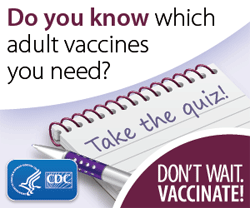Is Your Adult Vaccination Record Current?

Having an up-to-date vaccination record is important. This record tells you and your doctor if you’re protected against vaccine-preventable diseases. Use these tools to keep track of your immunizations.
An up-to-date vaccination record (also called an immunization record) is a history of all the vaccines you have ever received. This record lets you know if you have some immunity against serious diseases. An accurate record also saves you time and money by ensuring you don’t get unnecessary vaccines. It can be hard to track down a misplaced vaccination record. If your personal record is missing, you may need to recreate it by looking at your medical history.
Adult Vaccination is Important
Every year thousands of adults in the U.S. become sick from vaccine-preventable diseases. Many adults visit the hospital as a result, and some adults even die from these diseases. Even if you received vaccines as a child, the protection from some vaccines can wear off over time. You may also be at risk for other diseases due to your age, job, lifestyle, travel habits, or health conditions.
Vaccination helps protect you as well as other people. Being vaccinated can reduce the chance that you’ll spread illnesses to other people. Children who are too young to get vaccinated and older adults are especially vulnerable to infectious diseases. You can help protect them by getting vaccinated.
Take this short quiz to find out which vaccines you need. The quiz will generate a custom printout that you can take to your next medical appointment.

Vaccination records may be stored with other important documents.
Tools to Record Your Vaccinations
Today we move, travel, and change healthcare professionals more often than we did in the past. Finding old immunization information can be difficult and time-consuming. Keeping an updated immunization record in your home will save you time and hassle. You should store it in a safe place with other important documents.
Ask your doctor, pharmacist, or other vaccine provider for an immunization record form. Or you may download and use this form. [412 KB] Bring one of these forms with you to all your health visits. Ask your vaccine provider to sign and date the form for each vaccine you receive. This will help to ensure that your immunization information is current and correct. Your vaccine provider may also take part in an immunization registry. If so, ask your provider to document each of your vaccinations in the registry.
Where to Look for Vaccination Records
If you don’t have a complete record, you can search for evidence of your vaccination history. Look in places where you might find or keep other important documents. Here are some tips:
- Ask parents or other caregivers if they have records of your childhood immunizations.
- Look through baby books or other saved documents from your childhood.
- Check with your high school or college health services for vaccination records. Most schools only keep records for 1–2 years after students leave the system.
- Check with previous employers (including the military) that may have required immunizations.
- Check with your doctor or public health clinic. Many offices maintain vaccination records for a limited number of years.
- Contact your state’s health department. Some states have registries (Immunization Information Systems) that include adult vaccinations.
Unfortunately, there is no national organization that maintains vaccination records. The Centers for Disease Control and Prevention (CDC) does not have this information.
What to Do If You Can’t Find Your Records
If you cannot find your personal vaccination records, you may end up receiving vaccines that you had in the past. While this is not ideal, it is safe to repeat vaccines. Additionally, your doctor may want to do blood tests to see if you are immune to certain vaccine-preventable diseases.
More Information
- Vaccine Information for Adults
- Tips for Finding Old Immunization Records, Immunization Action Coalition
- Adult Vaccination Tracker and Guide, National Foundation for Infectious Diseases
- Immunization Schedules for Adults in Easy-to-read Formats
- Vaccination Records for Kids
- Mantenga los registros de sus vacunas al día
- Page last reviewed: October 2, 2017
- Page last updated: October 2, 2017
- Content source:
- National Center for Immunizations and Respiratory Diseases
- Page maintained by: Office of the Associate Director for Communication, Digital Media Branch, Division of Public Affairs




 ShareCompartir
ShareCompartir
